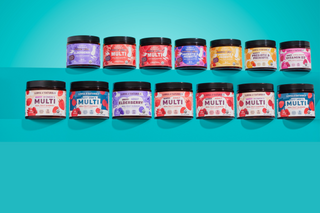Key Points:
- Prenatal vitamins are recommended to promote your baby’s growth and development.
- It’s important to start taking prenatal vitamins as early as one month before getting pregnant, or as soon as you realize that you’re pregnant.
- The key things you should look for in a prenatal vitamin are the dosage, quality, and third-party certifications.

Pregnancy is a time you want to take the best care of yourself so that you give your little one a healthy start. Part of this involves ensuring that you have all the nutrients both of you need, such as vitamins.
Dietary supplements like prenatal vitamins can fill in the nutritional gaps, and help your baby thrive. But when should you start taking prenatal vitamins?
In this blog, we’ll discuss what prenatal vitamins are and why they’re needed. We’ll also examine the best time to start taking prenatal vitamins, as well as how to pick the best prenatal supplement. Read on to learn all the important stuff about prenatal vitamins.
Why Are Prenatal Vitamins Important?
As the name suggests, prenatal vitamins are vitamin (and mineral) supplements that are taken during pregnancy.
Right from conception, your baby needs certain key nutrients to grow and develop. A healthy diet alone may not be enough to give you what your body needs, and still nourish your growing baby adequately.
Prenatal vitamins are a common recommendation for pregnant women. They’re often prescribed as a way to reduce the risk of malnutrition and birth defects.
Prenatal vitamins are usually formulated together with some important minerals. They’re different from the usual multivitamins because they contain recommended levels of micronutrients — such as folic acid and iron — that differ from the levels for non-pregnant women.
Let’s take a look at why prenatal vitamins and minerals are important.
1. Folic Acid
During early pregnancy, folic acid (vitamin B9) helps your baby to develop a healthy nervous system. It takes part in the formation of something known as the neural tube, from which the baby’s brain and spinal cord develop.
Lack of enough folic acid can lead to birth defects. It can either affect the closure of the baby’s brain (anencephaly) or the spinal cord (spina bifida). Many guidelines recommend that pregnant women take 400-1,000 micrograms of folic acid.
Natural forms of vitamin B9 (folate) are preferred to the synthetic ones (folic acid). This is because of the potential for folic acid to accumulate to toxic levels, especially in people with a MTHFR gene variation. The MTHFR gene codes for the enzyme MTHFR, which converts folic acid into its active form, methylfolate.
A lack of MTHFR can cause toxic build-up of both folic acid and an amino acid called homocysteine. Methylfolate, the active form of folic acid, usually converts homocysteine to a harmless amino acid called methionine. Lack of methylfolate can lead to accumulation of homocysteine. Research has shown that high levels of homocysteine in the blood is a risk factor for frequent miscarriages.
2. Vitamin D
Vitamin D regulates the amount of calcium and phosphorus in the body. Why is this important? A meticulous balance of calcium and phosphorus is needed to strengthen your baby’s bones and teeth.
3. Vitamin C
Vitamin C helps with tissue repair and healing, which is especially important after delivery. Vitamin C is also needed for the formation of strong bones. Kids born to mothers who lacked vitamin C during pregnancy may experience poor bone development.
Other benefits of vitamin C include boosting immunity and promoting healthy skin development.
4. Other B Vitamins
Apart from folate, other B vitamins are needed to have a healthy pregnancy. They play several roles, including easing digestion, preventing constipation, boosting energy production, and skin and eye development.
5. Iron
Iron is a mineral that helps in the formation of red blood cells. Red blood cells are the means through which oxygen is transported around the body.
Lack of enough red blood cells causes anemia, a condition that may hinder the baby’s development. Most prenatal vitamins also contain iron supplements as part of the formulation.
When Should You Start Taking Prenatal Vitamins?

If you’re already pregnant or planning to get pregnant, you’re probably concerned about being as healthy as possible. When should you start taking prenatal vitamins?
Let's delve in a bit more to understand the science. In general, the recommendations follow two lines of thought:
1. When You Decide to Get Pregnant
The best time to start taking prenatal vitamins is when you decide to conceive, at least a month before pregnancy. This is because it takes some time for your body to create the nutrient stores you’ll need during pregnancy.
Also, vitamins such as folate/folic acid are required during the early weeks of pregnancy. Most pregnancies are typically not discovered until the first month when symptoms set in. Your baby is at risk of birth defects if you lack these vital nutrients during early pregnancy.
Be sure to talk with your healthcare provider about prenatal vitamins before you get pregnant.
2. As Soon as You Find Out You’re Pregnant
Many pregnancies are unplanned. This makes it difficult to start prenatal vitamins before the pregnancy.
As such, the next best time to start taking prenatal vitamins is when you find out you’re pregnant. You should take prenatal vitamins at least until the end of the first trimester, though most guidelines recommend taking them throughout pregnancy.
If you have questions about when to take prenatal vitamins, talk to your doctor and pharmacist. They’ll help answer all your questions and make sure that you’re getting all the right nutrients.
What to Look For in a Prenatal Vitamin Supplement
There are many vitamin supplements available over-the-counter, so it’s difficult to know which ones to choose. The things you should look out for in a prenatal vitamin include:
1. Dosage
Prenatal vitamins are specifically formulated for pregnant women. They should contain dosages that meet the daily requirements during pregnancy.
For example, the American College of Obstetricians and Gynecologists (ACOG) recommends 400 mcg of folic acid daily during the first trimester. During pregnancy, you need at least 600 mcg of folic acid everyday. It’s difficult to get this amount of folic acid from food alone, hence the need for a prenatal vitamin with at least 400 mcg of folic acid, ideally starting from one month before pregnancy through the first 12 weeks.
Some supplements may not have this dosage, so ensure your supplements meet this recommendation to avoid folic acid deficiency. Too much of a supplement can also affect both you and your baby’s health. The side effects of supplements are magnified if taken in excess.
2. Regulatory oversight
The FDA regulates dietary supplements differently from other food and drugs. As a result, you never know if the supplements you’re using meet the required standards.
Look out for certifications of third-party regulation from reputable groups like the Office of Dietary Supplements.
3. Quality
Be sure to check the ingredients in the supplements you’re using. Good supplements are made from organic ingredients with no added synthetic substances like preservatives.
For the best high-quality vitamin supplements for you and your child, choose Llama Naturals Plant-Based Multivitamin Gummies.
Llama Naturals gummy vitamins contain 13 essential plant-based vitamins, sourced from real fruits and vegetables and carefully formulated for optimal absorption.
The gummies are free from any added sugars, artificial sweeteners, flavors, and preservatives, giving you the best of nature’s goodness without any unhealthy additives. They’re available for both adults and kids to ensure you all have the quality health you deserve.
Prenatal Vitamins: The Healthy Start Your Baby Deserves

During pregnancy, your body needs certain important nutrients, such as vitamins, to support both your health and your baby’s growth and development. A balanced diet alone may not be sufficient to meet your nutritional requirements.
Prenatal vitamins are available to fill in the nutritional gaps. Choosing the right time to start taking them can be tricky. To ensure your baby doesn’t miss out on these nutrients, it’s important to start taking them early enough.
In general, when you should start taking prenatal vitamins is when you decide to get pregnant. If you don’t manage to start prenatal vitamins before conception, you should do so as soon as you find out you’re pregnant.
If you're looking for the best, high-quality supplements for both you and your child, choose Llama Naturals’ wide array of health-promoting supplements. Llama Naturals gummies are made from organic ingredients with no nasty additives. With Llama Naturals in the picture, you can ensure that you get the best, all-natural products you deserve.
Llama Naturals is a plant-based nutrition brand that has created the World's First Whole Fruit Gummy Vitamins that are made with no added sugar and whole-food vitamins. They are USDA Organic, Vegan, Gluten-Free, free of common allergens, and are slow-cooked on low heat to retain rich phytonutrients & fruit flavor. It’s a win-win gummy vitamin that the whole family will love.




